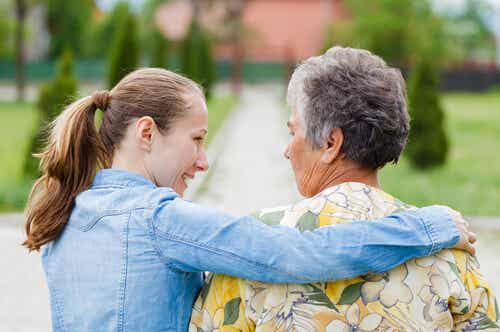Psychoeducation Programs for Caregivers


Written and verified by the psychologist Ángel Redondo
People who suffer from schizophrenia, autism spectrum disorder, dementia, and other chronic or degenerative diseases require support and treatment. Of course, it’s not just the patient who needs help. Those closest to them need assistance as well. One of the best treatments available, not only for the patient but also for the other people in their lives who act as their caregivers, is psychoeducation (PE). Why is this treatment necessary?
It’s because much of the burden of caring for the patient falls on their family. In many cases, there may only be a single caregiver. Some studies indicate that up to 75 percent of the dependent person’s needs are covered by their family or other close friends. That’s a lot of support!
When you consider the chronic nature of many mental or physical disorders, you can see why it’s not just hard on the patient. Their carer also has a heavy burden to bear.
Problems for caregivers: burnout
The caregiver may realize that their role is necessary and fitting. However, it also involves many lifestyle changes and can pose a risk to their physical and mental health. The carer may not always be aware of the immense stress they’re under. Psychoeducation can help to relieve this exact problem of burnout in caregivers.

Burnout is a complex concept. In this context, it refers to the difficulties that can arise in caring for someone who’s sick. You could summarize these problems in the following list:
- The impact of the caregiving role on the carer and their family member.
- The whole group of physical, psychosocial, and economic problems that may arise for the caregiver.
- The changing experience due to the conditions of care and the situation of the carer.
Treatment options: psychoeducation for caregivers
In recent years, researchers have noted the importance of using PE to assist families, especially the primary caregiver. The focus should be on helping them to avoid or reduce their stress. This helps to relieve the burdens that come with caregiving.
Through a structured program, the goal is to provide the caregiver with the skills and knowledge they need to care for a patient. They’ll also learn to care for themselves better. Within the range of psychosocial treatments available, you’ll find that PE is an outstanding option.
One or more professionals usually oversee the treatment program. The program may last for between seven to 15 sessions, which may be weekly or once every two weeks. The caregiver will have time to practice the skills they learn between sessions. Each session may last between one and two hours. Group sessions are common, and the carer may supplement them with individual consultations.
One of the main goals is to reduce the caregiver’s stress levels. They learn strategies and skills to continue to look after themselves while caring for their family member. Also, during the group sessions, caregivers will learn to better cope with situations that arise during care. Of course, they’ll be able to exchange experiences and receive emotional support.
In a PE treatment program, you’ll note the following three areas:
Education about the patient’s disease
Caregivers will learn about the relationship between dependency, illness, and behavior. That way, they’ll understand that some things the patient may do are a result of the disease not because they want to be difficult.
Learning to take better care of the patient
The caregivers will learn skills to better cope with difficult situations. For instance, they may work on communication with the patient or learn strategies to reduce dysfunctional behavior. They’ll also learn how to manage the patient’s physical and social environment. This can include knowing how to distinguish and eliminate barriers or problems in the patient’s surroundings.

Care for the caregivers
Through education and various techniques, the carer will learn how to look after themselves better. For example, this can include stress management, relaxation and emotional relief techniques, problem-solving, and learning to be assertive.
Is psychoeducation effective for caregivers?
Current studies show that the effectiveness of PE treatments is relative. However, this is due more to the different methods used, which makes it a little difficult to obtain solid evidence. Further research is needed to overcome the current limitations.
Despite this, it’s recognized that psychoeducation programs do have definite benefits for caregivers, and in turn for the patients. These treatments can help the caregiver to reduce dysfunctional behavior. That can help the patient be able to remain at home for longer.
People who suffer from schizophrenia, autism spectrum disorder, dementia, and other chronic or degenerative diseases require support and treatment. Of course, it’s not just the patient who needs help. Those closest to them need assistance as well. One of the best treatments available, not only for the patient but also for the other people in their lives who act as their caregivers, is psychoeducation (PE). Why is this treatment necessary?
It’s because much of the burden of caring for the patient falls on their family. In many cases, there may only be a single caregiver. Some studies indicate that up to 75 percent of the dependent person’s needs are covered by their family or other close friends. That’s a lot of support!
When you consider the chronic nature of many mental or physical disorders, you can see why it’s not just hard on the patient. Their carer also has a heavy burden to bear.
Problems for caregivers: burnout
The caregiver may realize that their role is necessary and fitting. However, it also involves many lifestyle changes and can pose a risk to their physical and mental health. The carer may not always be aware of the immense stress they’re under. Psychoeducation can help to relieve this exact problem of burnout in caregivers.

Burnout is a complex concept. In this context, it refers to the difficulties that can arise in caring for someone who’s sick. You could summarize these problems in the following list:
- The impact of the caregiving role on the carer and their family member.
- The whole group of physical, psychosocial, and economic problems that may arise for the caregiver.
- The changing experience due to the conditions of care and the situation of the carer.
Treatment options: psychoeducation for caregivers
In recent years, researchers have noted the importance of using PE to assist families, especially the primary caregiver. The focus should be on helping them to avoid or reduce their stress. This helps to relieve the burdens that come with caregiving.
Through a structured program, the goal is to provide the caregiver with the skills and knowledge they need to care for a patient. They’ll also learn to care for themselves better. Within the range of psychosocial treatments available, you’ll find that PE is an outstanding option.
One or more professionals usually oversee the treatment program. The program may last for between seven to 15 sessions, which may be weekly or once every two weeks. The caregiver will have time to practice the skills they learn between sessions. Each session may last between one and two hours. Group sessions are common, and the carer may supplement them with individual consultations.
One of the main goals is to reduce the caregiver’s stress levels. They learn strategies and skills to continue to look after themselves while caring for their family member. Also, during the group sessions, caregivers will learn to better cope with situations that arise during care. Of course, they’ll be able to exchange experiences and receive emotional support.
In a PE treatment program, you’ll note the following three areas:
Education about the patient’s disease
Caregivers will learn about the relationship between dependency, illness, and behavior. That way, they’ll understand that some things the patient may do are a result of the disease not because they want to be difficult.
Learning to take better care of the patient
The caregivers will learn skills to better cope with difficult situations. For instance, they may work on communication with the patient or learn strategies to reduce dysfunctional behavior. They’ll also learn how to manage the patient’s physical and social environment. This can include knowing how to distinguish and eliminate barriers or problems in the patient’s surroundings.

Care for the caregivers
Through education and various techniques, the carer will learn how to look after themselves better. For example, this can include stress management, relaxation and emotional relief techniques, problem-solving, and learning to be assertive.
Is psychoeducation effective for caregivers?
Current studies show that the effectiveness of PE treatments is relative. However, this is due more to the different methods used, which makes it a little difficult to obtain solid evidence. Further research is needed to overcome the current limitations.
Despite this, it’s recognized that psychoeducation programs do have definite benefits for caregivers, and in turn for the patients. These treatments can help the caregiver to reduce dysfunctional behavior. That can help the patient be able to remain at home for longer.
All cited sources were thoroughly reviewed by our team to ensure their quality, reliability, currency, and validity. The bibliography of this article was considered reliable and of academic or scientific accuracy.
- Martín Carrasco , M., Domínguez Panchón , A., González Fraile , E., & Muñoz Hermoso , P. (2011). Programa Psicoeducativo para el manejo de la Sobrecarga en el Cuidador del paciente con Demencia .Madrid: Instituto de Investigaciones Psiquiátricas (IIP) / Fundación Ma Josefa Recio .
- Losada Baltar , A., Montorio Cerrato , I., Fernández de Trocóniz , M., & Márquez González , M. (2006). Estudio e intervención sobre el malestar psicológico de los cuidadores de personas con demencia. El papel de los pensamientos disfuncionales.Madrid : Instituto de Mayores y Servicios Sociales (IMSERSO).
This text is provided for informational purposes only and does not replace consultation with a professional. If in doubt, consult your specialist.







